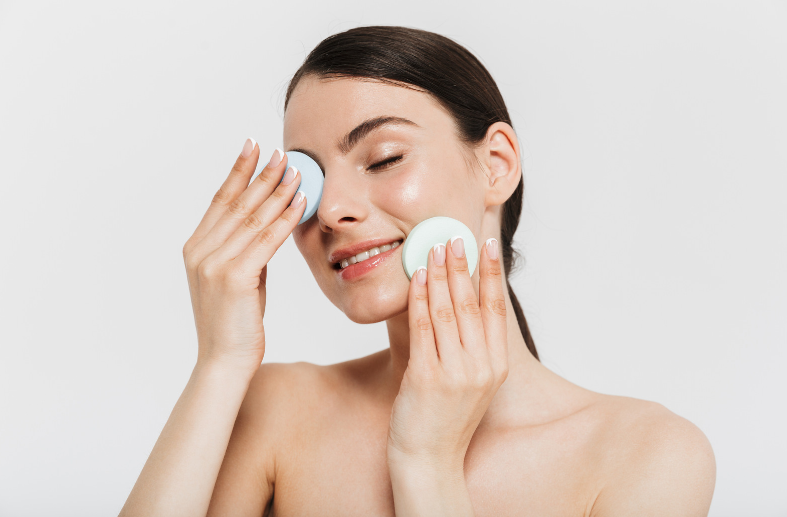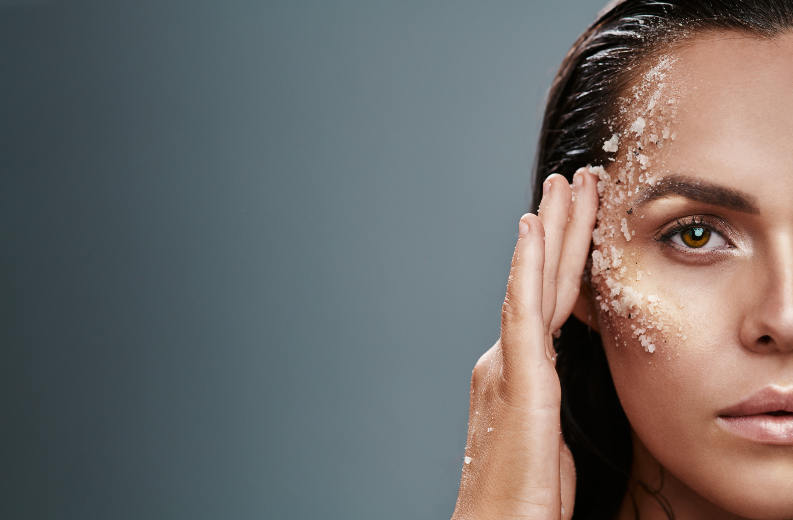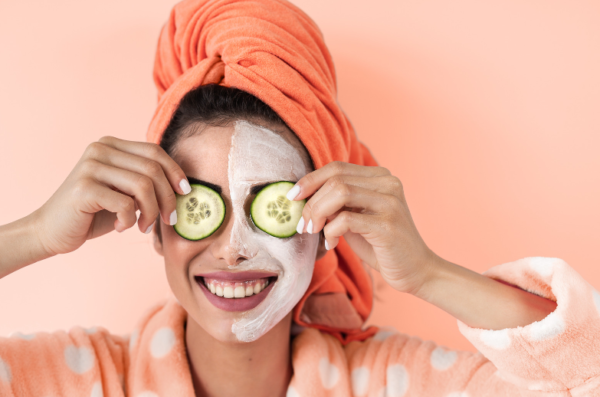Having smooth and glowing skin is something that many people desire. However, factors such as genetics, age, and lifestyle choices can affect skin texture. Having great skin texture can help you improve your confidence and self-esteem in your professional and personal life In this article, we’ll explore tips on how to improve skin texture and achieve a healthier, radiant complexion.
What is Skin Texture?
Skin texture refers to the state of our skin’s surface. The skin should ideally be soft and smooth with an even texture, however, it’s not unusual to have skin that feels coarse and uneven.
10 Causes of Rough Skin Texture
Rough skin texture can be caused by several factors, including genetics, age, sun exposure, poor diet, dehydration, lack of sleep, lack of exercise, smoking, alcohol consumption, and hormonal changes. So the first step to knowing how to improve skin texture is to know the causes of rough skin texture. Let’s dive into each of these factors in more detail:
- Genetics: Genetics plays a significant role in skin texture. If your parents or grandparents have rough skin, you may also have a predisposition to it.
- Age: As we age, our skin’s natural exfoliation process slows down, causing a buildup of dead skin cells on the surface. This can make the skin appear rough and dull.
- Sun exposure: Prolonged exposure to the sun’s harmful UV rays can damage the skin’s collagen and elastin fibers, leading to rough, uneven skin texture.
- Poor diet: A poor diet lacking essential nutrients can contribute to rough skin texture. Nutrients like vitamins A, C, and E, as well as omega-3 fatty acids, are crucial for maintaining healthy skin.
- Dehydration: Dehydration can cause the skin to become dry and rough. It’s important to drink plenty of water to keep the skin hydrated and healthy.
- Lack of sleep: A lack of sleep can cause the skin to appear tired, dull, and rough. During sleep, the skin repairs itself, so it’s essential to get enough rest for healthy skin.
- Lack of exercise: Exercise is crucial for maintaining healthy skin. It increases blood flow and oxygenation to the skin, improving your body’s flexibility, which can improve skin texture and appearance.
- Smoking: Smoking can cause premature aging and damage to the skin’s collagen and elastin fibers, leading to rough, uneven skin texture.
- Alcohol consumption: Alcohol can dehydrate the skin, causing it to appear dry and rough. It can also contribute to premature aging and damage to the skin’s collagen and elastin fibers.
- Hormonal changes: Hormonal changes, such as those during puberty or menopause, can cause changes in the skin’s texture and appearance.
9 Top Tips to Improve Skin Texture

Improving skin texture is achievable with some simple lifestyle changes. So if you want to get your husband in your side you got to work on those important tips. Here are our top tips to follow from our ultimate guide to how to improve skin texture:
1. Exfoliate Regularly
Exfoliating aids in the removal of dead skin cells, which can cause the skin to seem rough and drab. Additionally, it allows moisturizers to penetrate deeper into the skin, improving texture. To attain smoother skin, use a light exfoliating scrub once or twice a week.
2. Use Sunscreen
Sun exposure is a primary contributor to rough skin texture. Apply sunscreen with an SPF of at least 30 to your skin every day, even if it’s cloudy outside, to protect it from harmful UV rays.
3. Stay Hydrated
Water consumption is critical for keeping good skin. Dehydration can result in dry, rough skin, so drink at least eight glasses of water every day.
4. Follow a Healthy Diet
Eating a nutritious diet high in vitamins, minerals, and antioxidants will help improve skin texture. Include fruits, vegetables, whole grains, lean protein, and healthy fats in your diet.
5. Get Enough Sleep
Sleep is critical for general health and well-being, including healthy skin. Aim for 7-8 hours of sleep per night to aid in skin repair and regeneration. Not you can enhance your skin texture in a good sleeping routine but also you can improve leg blood flow while you sleep.
6. Exercise Regularly
Exercise improves the texture of the skin by increasing blood flow and oxygenation. To gain the advantages for your skin, aim for at least 30 minutes of moderate activity every day. Try walking for 5 miles every time you feel in a good mood for some fresh air.
7. Avoid Smoking and Alcohol
Smoking and alcohol intake can have a negative impact on skin texture. Both can promote skin dehydration and accelerated aging, resulting in rough, dull skin.
8. Use Moisturizer
Keeping your skin moisturized is essential for smooth, supple skin. To keep your skin moisturized, use a moisturizer that is appropriate for your skin type and apply it twice a day.
.
9. Try Professional Treatments
Chemical peels, microdermabrasion, and laser resurfacing are all professional procedures that can help improve skin texture. Consult a skincare professional to determine the best treatment for your skin type and concerns.
The Ultimate Guide to Skin Exfoliation: How to Get A Perfect Skin Texture

Exfoliating your skin is an essential part of any skincare routine. it’s an important aspect of your journey o how to improve skin texture It involves removing the top layer of dead skin cells to reveal a brighter, smoother, and healthier complexion.
What is Skin Exfoliation?
Skin exfoliation is the removal of dead skin cells from the skin’s surface. These dead skin cells can accumulate over time, making your complexion appear dull and lifeless. Exfoliation aids in the removal of this layer of dead skin cells, exposing a brighter, smoother, and healthier complexion.
How To improve skin texture: Benefits of Skin Exfoliation
There are many benefits to exfoliating your skin regularly, including:
- Brighter, more radiant skin
- Smoother texture
- Minimized appearance of pores
- Reduced appearance of fine lines and wrinkles
- Improved absorption of skincare products
- Reduced breakouts and acne
- Enhanced skin renewal and regeneration
Types of Exfoliators
There are two main types of exfoliators: physical and chemical.
Physical Exfoliants
Physical exfoliants are products that exfoliate dead skin cells using a physical scrape or abrasive. Scrubs, brushes, sponges, and even certain facial washing equipment fall within this category. Physical exfoliants are ideal for people who have oily skin or seek a more immediate sensation of smoother skin.
Chemical Exfoliants
Chemical exfoliants dissolve and remove dead skin cells by using chemicals such as alpha and beta hydroxy acids (AHAs and BHAs). They are usually available as toners, serums, masks, or peels. Chemical exfoliants are ideal for people with sensitive skin or who wish to exfoliate more deeply without using physical abrasives.
Choosing the Right Exfoliant for Your Skin Type
Choosing the proper exfoliant for your skin type is critical to achieving the greatest results. Physical exfoliants may be beneficial if you have oily or mixed skin. Chemical exfoliants may be a better alternative if you have dry or sensitive skin.
How Often Should You Exfoliate?
The frequency with which you exfoliate is determined by your skin type and the type of exfoliant you use. In general, those with oily skin can exfoliate up to 3-4 times per week, while those with dry or sensitive skin should only exfoliate once or twice per week. It is critical to pay attention to your skin and alter the frequency of exfoliation as needed.
How to Exfoliate Your Skin
To exfoliate your skin, first, wash it with a light cleanser. Then, in a circular motion, apply your exfoliant of choice, focusing on areas with more dead skin buildup. Avoid contact with the eyes and any areas of damaged skin. Remove the exfoliator with lukewarm water and apply your favorite moisturizer.
Tips for Safe and Effective Exfoliation
- Always choose an exfoliant that is suitable for your skin type.
- Avoid using harsh physical exfoliants, such as apricot kernel scrubs, as they can cause micro-tears in your skin.
- Don’t over-exfoliate, as this can lead to irritation and damage to your skin’s natural barrier.
- Be gentle when exfoliating, especially if you have sensitive skin.
- Follow up with a moisturizer to hydrate and protect your newly exfoliated skin.
Common Exfoliation Mistakes to Avoid
- Using a scrub that is too harsh for your skin type.
- Over-exfoliating, which can lead to irritation and damage.
- Using an exfoliant on broken or irritated skin.
- Neglecting to moisturize after exfoliating.
DIY Exfoliating Recipes
If you prefer to make your own skincare products, there are plenty of DIY exfoliating recipes available online. Some popular ingredients for at-home exfoliating include sugar, coffee grounds, and oatmeal.
Exfoliating for Different Skin Types
Different skin types require different types of exfoliation. Here are some tips for exfoliating based on your skin type:
- Oily skin: Use a physical exfoliant up to 3-4 times per week to help control excess oil and remove dead skin buildup.
- Dry skin: Use a gentle chemical exfoliant once or twice per week to avoid over-drying your skin.
- Sensitive skin: Use a chemical exfoliant that is specifically formulated for sensitive skin, and avoid using any harsh physical exfoliants.
4 Best Natural Remedies for Smooth Skin Texture
In addition to lifestyle changes and professional treatments, natural remedies can also help improve skin texture. Here are some remedies to try:
1. Aloe Vera
Aloe vera has anti-inflammatory and soothing properties that can help improve skin texture. Apply fresh aloe vera gel to your face and leave it on for 10-15 minutes before rinsing it off with warm water.
2. Honey
Honey is a natural humectant that can help hydrate the skin and improve its texture. Apply raw honey to your face and leave it on for 15-20 minutes before rinsing it off with warm water.
3. Green Tea
Green tea is rich in antioxidants that can help protect the skin from sun damage and improve its texture. Brew a cup of green tea, let it cool, and apply it to your face with a cotton ball. Leave it on for 10-15 minutes before rinsing it off with warm water.
4. Lemon Juice
Lemon juice is a natural exfoliant that can help remove dead skin cells and improve skin texture. Mix lemon juice with honey and apply it to your face, avoiding the eye area. Leave it on for 10-15 minutes before rinsing it off with warm water.
Conclusion
In conclusion for our guide on how to improve skin texture. Simple lifestyle adjustments and natural therapies can help improve skin texture. Exfoliating on a regular basis, wearing sunscreen, staying hydrated, eating a nutritious diet, getting enough sleep, exercising on a regular basis, avoiding smoking and drinking, and using a moisturizer can all help improve skin texture. Natural therapies like aloe vera, honey, green tea, and lemon juice can also help improve skin texture.
FAQs
Skin texture refers to the smoothness, softness, and overall appearance of your skin. It can be affected by factors such as genetics, aging, environmental factors, and lifestyle choices.
To improve skin texture, drink plenty of water, follow a healthy diet, protect your skin from the sun, use gentle skincare products, exfoliate regularly, and moisturize daily. following expert tips will help you to improve skin texture.
Yes, a poor diet lacking in nutrients can contribute to rough skin texture.
Yes, lack of sleep can cause dry, rough skin and lead to premature aging.
Yes, both smoking and alcohol consumption can dehydrate the skin and cause premature aging, leading to rough, dull skin.
Exfoliating once or twice a week is generally recommended to improve skin texture.
Yes, natural remedies such as aloe vera, honey, green tea, and lemon juice can be effective in improving skin texture. However, it’s important to note that results may vary depending on individual skin type and concerns.
Yes, exfoliating can be beneficial for all skin types, but it’s important to choose the right exfoliant for your skin type and to avoid over-exfoliating.

